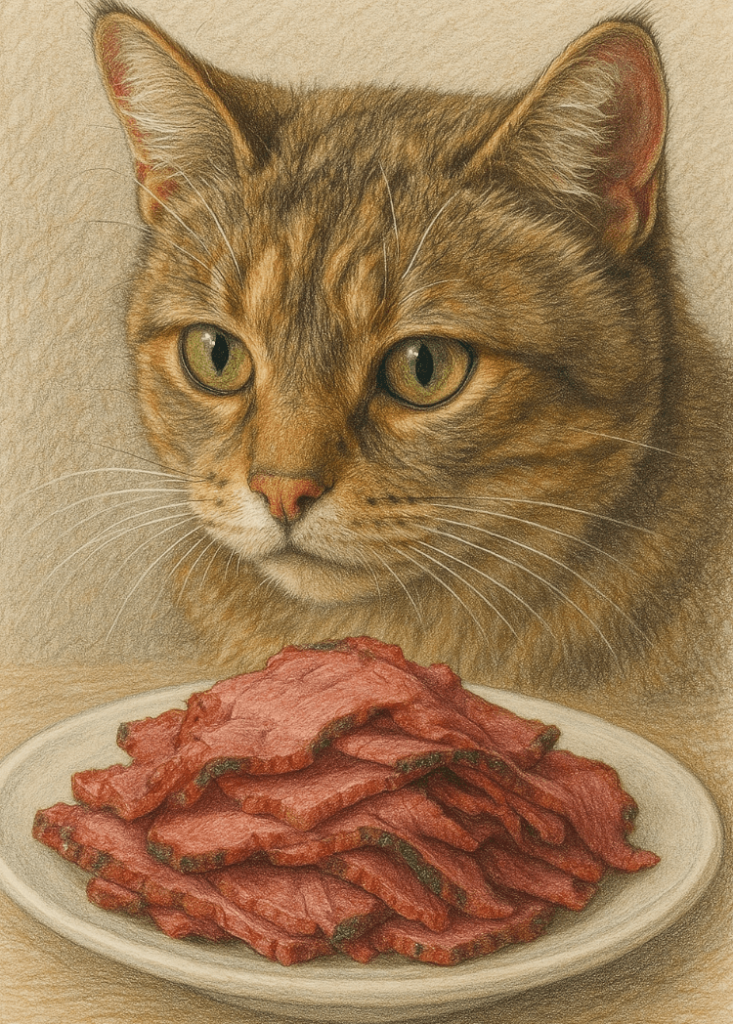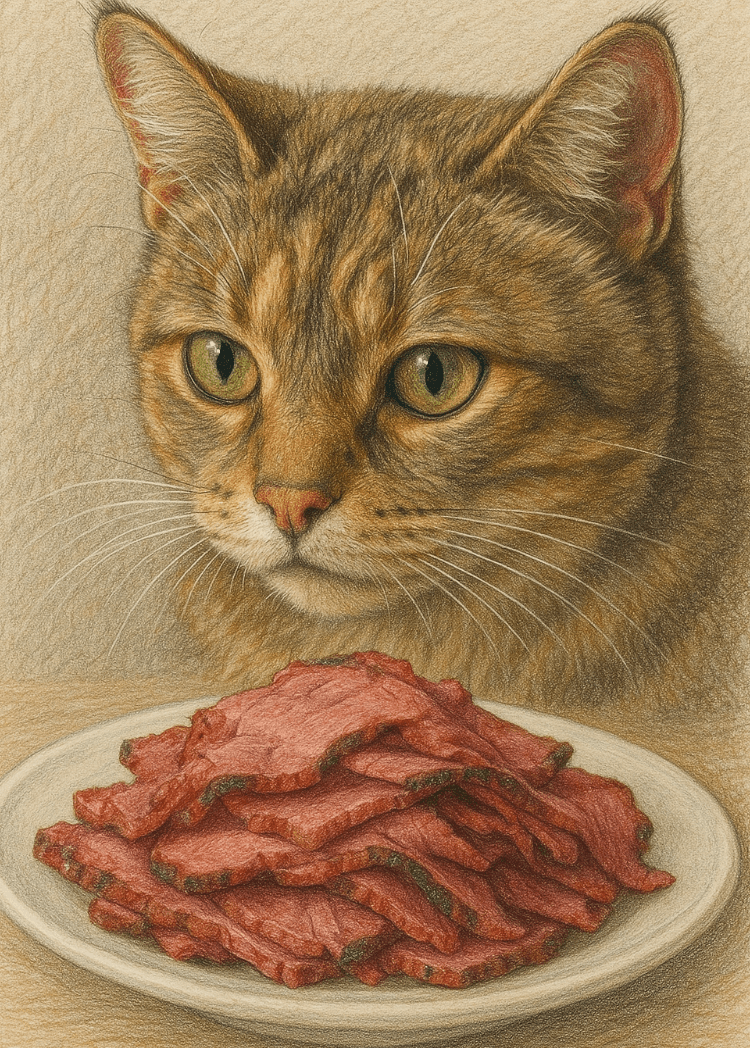Can Cats Eat Pastrami?
When it comes to treating our feline friends, many pet owners wonder whether human foods like pastrami are safe for cats. Pastrami, a type of cured and seasoned meat, might seem like a tempting snack to share with your cat due to its strong aroma and savory flavor. However, what’s tasty and safe for humans isn’t always suitable for our furry companions. Understanding the potential risks and benefits of feeding pastrami to your cat is essential to ensure their health and well-being. In this blog post, we’ll explore whether cats can eat pastrami, the possible dangers, and safer alternatives to keep your curious kitty happy and healthy.
Potential Risks of Feeding Pastrami to Cats
While pastrami may look harmless, it poses several risks to cats due to its ingredients and preparation methods. Here are some key concerns to consider before sharing this food with your feline friend.
High Sodium Content:
Pastrami is heavily salted during the curing process, which can lead to dehydration or even sodium poisoning in cats.Spices and Seasonings:
Many spices used in pastrami, such as garlic and onion powder, are toxic to cats and can damage their red blood cells.Processed Meat Concerns:
Processed meats often contain preservatives like nitrates and nitrites, which may be harmful to a cat’s digestive system over time.Fat Content:
The high fat content in pastrami can upset your cat’s stomach or contribute to obesity if consumed regularly.Choking Hazards:
Large pieces of pastrami can pose a choking risk, especially for smaller cats or those prone to gulping food.
These risks highlight why pastrami should generally be avoided as a treat for your cat. Always prioritize their safety over curiosity or indulgence.
Occasional Benefits of Lean Meats for Cats
While pastrami itself is not ideal, lean meats (in moderation) can provide nutritional value to cats. Here’s why protein-rich foods are important for felines, and how they differ from processed options like pastrami.
High-Quality Protein Source:
Cats are obligate carnivores, meaning they thrive on diets rich in animal-based proteins for muscle development and energy.Essential Amino Acids:
Lean meats contain taurine, an amino acid critical for a cat’s heart health, vision, and immune function.Hydration Support:
Moisture-rich meats can help keep cats hydrated, especially if they don’t drink enough water.Natural Nutrients:
Unprocessed meats offer vitamins and minerals that support overall health without artificial additives.Mental Stimulation:
Offering small amounts of safe, plain meat can satisfy a cat’s instinctual craving for prey-like textures and flavors.
While lean meats have benefits, it’s crucial to choose options that are unseasoned and free from harmful ingredients.
Check this guide 👉Can Cats Eat Gum? Best 7 Expert Tips!
Check this guide 👉Can Cats Eat Beef Fat? Best 7 Expert Tips!
Check this guide 👉Can Cats Eat Pig Ears? Best 7 Expert Tips!

Safe Meat Options for Cats | Foods to Avoid Feeding Cats |
|---|---|
Plain cooked chicken (no seasoning) | Processed meats like pastrami or bacon |
Boiled turkey (skinless and boneless) | Foods with garlic or onion powder |
Small portions of lean beef | High-sodium snacks or deli meats |
Cooked fish (occasionally) | Raw or undercooked meats |
Organ meats (in moderation) | Sugary or spicy foods |
How to Safely Introduce Human Foods to Your Cat
If you’re considering giving your cat human foods, including lean meats, it’s important to follow these guidelines to minimize risks and ensure their safety.
Start with Small Portions:
Introduce new foods gradually and in tiny amounts to monitor your cat’s reaction.Avoid Seasonings and Additives:
Skip salt, spices, sauces, or any flavor enhancers that could harm your cat’s digestive system.Check for Allergies:
Watch for signs of allergic reactions, such as vomiting, diarrhea, or skin irritation, after introducing a new food.Stick to Plain Proteins:
Opt for unseasoned, fully cooked meats without bones or fatty trimmings.Consult Your Veterinarian:
Always seek professional advice before making significant changes to your cat’s diet.
By following these steps, you can safely experiment with occasional treats while prioritizing your cat’s health.
Signs Your Cat May Be Struggling After Eating Pastrami
Even small amounts of pastrami can cause adverse effects in cats. If you suspect your cat has eaten pastrami, watch for these warning signs and act quickly if necessary.
Vomiting or Diarrhea:
These symptoms indicate digestive distress, often caused by high sodium or unfamiliar seasonings.Lethargy or Weakness:
Excessive salt intake can lead to dehydration or electrolyte imbalances, resulting in fatigue.Increased Thirst or Urination:
Consuming salty foods may prompt excessive drinking and urination as your cat tries to balance fluids.Difficulty Breathing:
Severe cases of sodium toxicity can cause respiratory issues; seek immediate veterinary care if this occurs.Loss of Appetite:
Refusal to eat or unusual behavior may signal discomfort or illness related to the ingested food.
Recognizing these signs early allows you to address potential problems promptly and prevent further complications.
Common Mistakes to Avoid When Feeding Cats Human Food
Feeding cats human food can be tricky, and mistakes can lead to health issues. Here are some common errors to avoid when deciding what to share with your cat.
Ignoring Ingredient Lists:
Many human foods contain hidden ingredients like garlic or onion powder, which are toxic to cats.Overlooking Portion Sizes:
Even safe foods can upset a cat’s stomach if given in large quantities. Stick to bite-sized portions.Assuming All Meats Are Safe:
Processed or seasoned meats, like pastrami, can harm cats despite being protein-based.Neglecting Hydration Needs:
Dry or salty foods can dehydrate cats; always provide fresh water alongside any treats.Skipping Veterinary Advice:
Failing to consult your vet before introducing new foods can result in unintended consequences.
Avoiding these mistakes ensures your cat stays healthy and happy.
Healthier Alternatives to Pastrami for Cats
If you want to treat your cat without compromising their health, here are some nutritious and safe alternatives to pastrami.
Plain Cooked Chicken:
Shredded or diced chicken makes an excellent protein-packed snack for cats.Boiled Turkey:
Remove the skin and bones, then serve small portions of this lean meat.Steamed Fish (No Bones):
Occasional servings of salmon or tuna (without seasoning) can be a special treat.Pumpkin Puree:
This fiber-rich food aids digestion and can be mixed with their regular meals.Cat-Specific Treats:
Commercially available treats formulated for cats are designed to meet their dietary needs safely.
These alternatives provide variety and nutrition without risking your cat’s health.
Understanding Your Cat’s Dietary Instincts
Cats are natural hunters with specific dietary instincts shaped by evolution. Understanding these behaviors helps explain why they’re drawn to certain foods—and why others are dangerous.
Carnivorous Nature:
Cats require animal-based proteins to thrive, as plant-based diets lack essential nutrients they need.Attraction to Strong Smells:
The aroma of cured meats like pastrami appeals to their hunting instincts, though it doesn’t mean it’s safe to eat.Preference for Fresh Foods:
In the wild, cats consume fresh prey; processed or spoiled foods can upset their delicate systems.Curiosity About Human Food:
Cats often investigate what their owners eat, but curiosity doesn’t equate to compatibility.Need for Balanced Nutrition:
While treats are fun, a cat’s primary diet should consist of specially formulated cat food to meet all their nutritional needs.
By understanding these instincts, you can better cater to your cat’s natural preferences while keeping them safe.
Frequently Asked Questions About Cats and Pastrami
Is it okay to give my cat a small piece of pastrami?
No, even small amounts can be harmful due to high sodium and potentially toxic seasonings.
What should I do if my cat accidentally eats pastrami?
Monitor them closely for symptoms of distress and contact your vet if you notice anything unusual.
Are there healthier meat options for cats?
Yes, plain cooked chicken, turkey, or lean beef are much safer choices.
Can kittens eat pastrami?
Kittens are more vulnerable to dietary issues; avoid giving them pastrami or other processed meats entirely.
Why does my cat beg for pastrami?
Cats are naturally attracted to the smell of meat, but begging doesn’t mean it’s safe for them to eat it.
Prioritizing Your Cat’s Health Over Curiosity
While it’s tempting to share table scraps like pastrami with your cat, their unique dietary needs and sensitivity to certain ingredients must come first. Processed meats like pastrami pose significant risks, from high sodium levels to toxic seasonings, making them unsuitable treats for our feline friends. By focusing on safer alternatives and consulting your veterinarian, you can ensure your cat enjoys a balanced and nutritious diet. Remember, your cat’s health and happiness depend on the choices you make—so always opt for what’s best for them, even if it means saying no to tempting human foods.
Do Cats Have Taste Buds? Best 7 Expert Tips! – Discover how cats experience flavors and why their taste is so unique.
Do Dogs Have Taste Buds? Best 7 Expert Tips! – Discover how dogs experience taste, their preferences, and what it means for their diet and health.
Can Cats Taste Sweet? Best 7 Expert Tips! – Discover why cats can’t taste sweetness, how it affects their diet, and tips to keep them healthy and happy.
Can Dogs Taste Sweet? Best 7 Expert Tips! – Discover how dogs perceive sweetness, which foods are safe, and tips to manage their sweet cravings responsibly.





